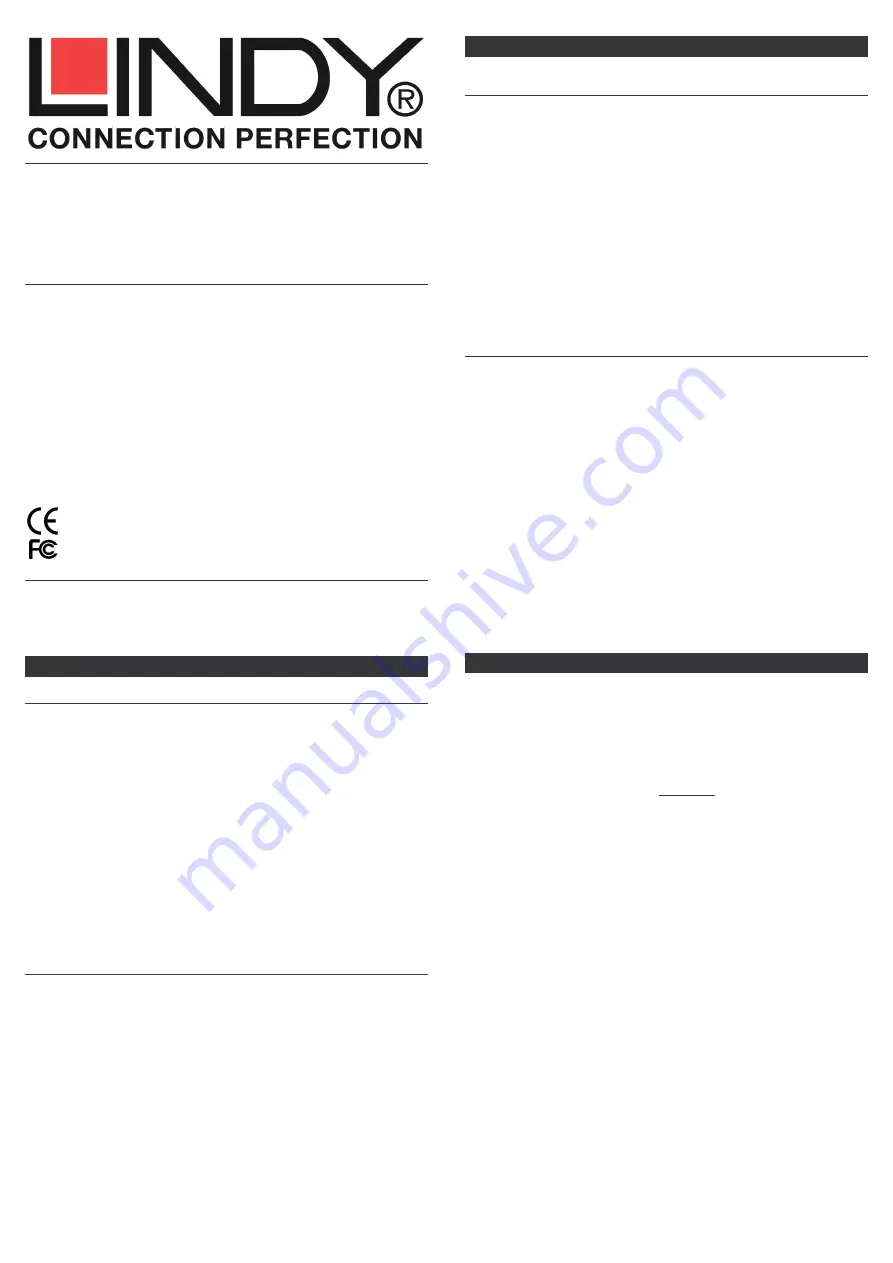
USB 3.0 Hard Drive Enclosure
Installation Guide
English
Installationsanleitung
Deutsch
Manuel d’utilisateur
Français
Manuale d’uso
Italiano
LINDY No. 43101
www.LINDY.com
© LINDY ELECTRONICS LIMITED & LINDY-ELEKTRONIK GMBH - FIRST EDITION (JAN 2010)
INSTALLATION
ENGLISH
Remove the plastic end cover without the screws by pressing the
two plastic latches or unlock the screws at the other end cap and
pull the plastic end cap out. Slide in the HDD so the connector
properly fits into the backplane. Press it firmly and reinstall the end
cap so both sides engage safely.
USB Cable and Connectors
This USB 3.0 enclosure is equipped with a modern USB 3.0 Mi-
cro-B connector. For USB 3.0 connections with up to 5Gb/s this
connection is mandatory. However, the USB 3.0 type A connector
of the supplied cable can also be plugged into USB 2.0/1.1 ports.
Deutsch
Entfernen Sie die Endkappe ohne Schrauben durch Zusammen-
drücken der beiden Kunststoffnasen oder entfernen Sie die beiden
Schrauben an der anderen Endkappe. Ziehen Sie die Endkappe
ab. Schieben Sie die Festplatte so ein, dass sie sicher in die An-
schlussleiste einrastet. Setzen Sie nun die Endkappe wieder so
ein, dass beide Seiten sicher einrasten.
USB Kabel und Anschlüsse
Dies USB 3.0 Gehäuse verfügt über eine moderne USB 3.0 Buch-
se die für USB 3.0 Verbindungen mit 5Gb/s unverzichtbar ist. Der
USB Typ A Stecker des mitgelieferten Kabels kann problemlos
auch an USB 2.0/1.1 Ports angeschlossen werden.
For Home and Office Use
Tested to Comply with FCC Standards
INSTALLATION
Français
Retirez la façade en plastique qui n’a pas de vis en pinçant les
extrémités de sa largeur, ou alors retirez les 2 vis à l’autre façade.
Une fois l’une des 2 façades retirées, insérez le disque dur de
telle sorte qu’il soit connecté sur la prise interne du boîtier. Repla-
cez l’une des 2 façades, et vérifiez bien qu’elles soient fixées
correctement.
Câble USB et prise
Ce boîtier USB 3.0 dispose d’une prise femelle USB 3.0 pour une
connexion USB 3.0 à 5Gbits/s. La prise USB type A du câble
fourni peut être connectée sans problème sur un port USB 2.0/1.1
de l’ordinateur.
Italiano
Rimuovere il frontalino in plastica senza le viti premendo le due
linguette in plastica oppure svitare le viti sul lato opposto e tirare il
frontalino. Inserire l’Hard Disk nella direzione esatta in modo da
consentire il corretto collegamento del connettore
nell’alloggiamento. Premere l’Hard Disk per permettere la connes-
sione e quindi reinstallare il frontalino in plastica.
Cavi e Connettori USB
Questo astuccio USB 3.0 ha un connettore USB 3.0 tipo Micro-B.
necessario per connessioni USB 3.0 ad una velocità massima di
5Gb/s. Comunque il connettore USB 3.0 tipo A del cavo incluso
nella fornitura può essere collegato a porte USB 2.0/1.1.
OPERATION
(ENGLISH)
Power Requirement
Modern 2.5” drives with low power requirements can normally be
powered by two of your computer’s root USB ports using the
supplied USB Power cable.
If you want to connect this enclosure to non-powered USB ports or
a bus powered hub an optional regulated 5VDC power supply has
to be connected to the DC input of the enclosure.
Driver Installation
Modern operating systems such as Windows 7, Vista, XP, 2000
and ME already include the necessary drivers.
LED Indicator
The LED indicator illuminates when the hard drive is connected
and powered up. The LED flashes during data transfer. Do not
disconnect the enclosure whilst the LED is flashing!
HDD Partitioning
If you use a brand new hard drive it may not be formatted or have
a partition and so your operating system will not show a drive
letter. Use the partitioning program from your operating system
(FDISK or similar). In Windows, Right click on
My Computer
and
select
Manage.
Then click
Disk Management
. On the bottom
right side the new drive should now be shown without a drive
letter. Right click on the grey field to the left of the drive and select
Initialize Disk
. Once completed you can right click on the new
drive, choose to format it and change drive letters according to
your requirements.
Find more information on this topic from the HELP section of your
operating system.


